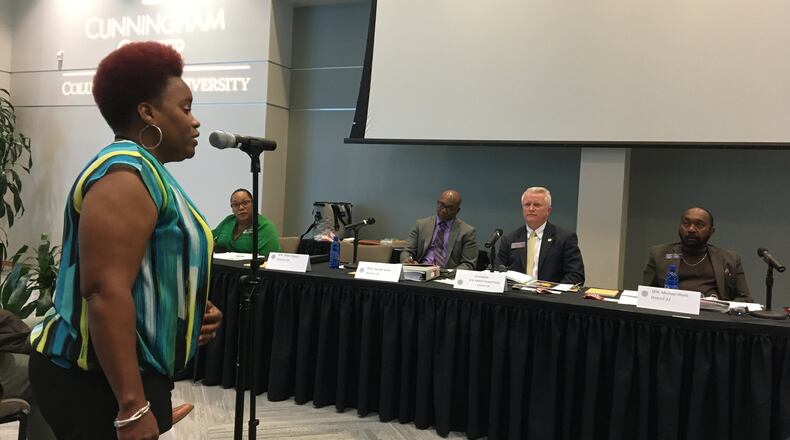Georgia senators on Friday began considering whether to restore the voting rights of many of the state's 250,000 felons, especially those who were convicted of nonviolent crimes.
But it remained unclear which crimes would be minor enough for offenders to be able to vote, and senators reached no conclusions about whether felons should regain their rights before they’ve paid off fines and fees.
Georgia is one of 22 states that denies felons the ability to vote even after they've been released from prison, requiring them to also complete parole, probation and pay fines and fees.
State Sen. Randy Robertson, the chairman of a committee studying the issue, said it's important for the Senate to evaluate whether felons should be able to vote.
“I would hope I’m not wasting my time today on something that’s fruitless,” Robertson, a Republican from Cataula and a former sheriff’s deputy, said after the committee’s meeting at Columbus State University. “Victims are going to have their voices heard, too. … Just starting the conversation is a big step forward.”
Senators and criminal justice groups appeared to agree that those convicted of drug possession charges should be able to vote when they’re freed from prison. It’s unclear whether other offenses, such as drug distribution, shoplifting and burglary, would qualify.
Most of Georgia’s felons, about 80%, are already living in their communities while finishing their probation or parole, said Maxwell Ruppersburg, the executive director of Reform Georgia, an organization focused on reducing incarceration.
“They paid their dues to society. Their sentence has been completed. If that’s true, why are we here having this discussion?” asked Paulette Hunt, a retired veteran who spoke during the public comment portion of the meeting. “Where is their justice? The punishment must fit the crime.”
All felons in Georgia are allowed to re-register to vote after they’ve finished all the conditions of their sentences, but that can take many years.
Probation sentences in Georgia last an average of 6.3 years, nearly double the national average, Ruppersburg said.
Alton Russell, the chairman of the Muscogee County Republican Committee, told senators that criminals lose their voting rights as a consequence of their actions.
“If somebody commits a crime and they’re sentenced, they’ve earned the right not to vote,” Russell said.
Georgia lawmakers will decide among several options for restoring felons’ voting rights.
They could simply exempt drug possession felonies, as proposed under Senate Bill 11. That measure, introduced by state Sen. Harold Jones, a Democratic member of the study committee representing Augusta, is still pending in the Georgia Senate after it didn't receive a hearing this year.
Legislators could also pass a bill defining which crimes are serious enough to result in a loss of voting rights.
The Georgia Constitution says those who have been convicted of a "felony involving moral turpitude" can't be registered to vote until their sentences are completed. But the state hasn't defined which felonies involve "moral turpitude," and election officials interpret the Constitution to mean that all felonies limit voting rights.
Another option for lawmakers would restore voting rights when felons are released from prison or jail but still owe fines or fees.
“I don’t see how you can say we’re going to take someone off the voting rolls when they’re productive citizens in every other sense of the word,” Jones said.
Sara Totonchi, the executive director for the Southern Center for Human Rights, said restoration of voting rights reduces the chance of recidivism as former criminals adjust to life after prison.
“It makes it so much harder for people who have heavy fines and fees to re-integrate into society,” Totonchi said.
The Senate committee plans to meet twice more this fall before making recommendations by December.
About the Author
Keep Reading
The Latest
Featured




